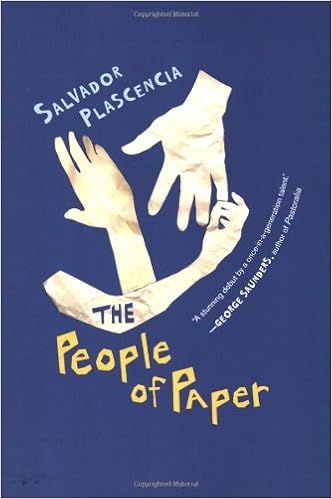 Salvador Plascencia’s debut novel The People of Paper raises questions regarding authorship and voice in a work. Blurring the lines between author and speaker, the work leaves readers questioning who is really getting to tell the story.
Salvador Plascencia’s debut novel The People of Paper raises questions regarding authorship and voice in a work. Blurring the lines between author and speaker, the work leaves readers questioning who is really getting to tell the story.
In a world where the victors of war (colonizers, or Saturn) dictate written history, The People of Paper offers a novel wherein the colonized (members of E.M.F.) have the opportunity to dictate their own point of view. This novel forces readers to question the authenticity of what they are reading; how much of the story has been fabricated, misrepresented, or mistold? This novel requires readers to glean their own understanding of truth by sifting through various sides of the same story.
The People of Paper presents authorship itself as an act of colonization, in the sense that the author Plascencia has colonized the pages with his words: “Saturn’s real name is Salvador Plascencia.” (pg. 102). However, with colonization follows a loss of culture.
pg. 119, 138 “You have sold everything, save yourself. So you remain but you have sold everything else. You have delivered all this into their hands, and for what? For fourteen dollars and the vanity of your name on the book cover.” (pg. 138)
At this point in the novel, Saturn (ie. Plascencia himself) writes this, himself suggesting through the character Liz’s voice that by writing this story, he is “selling out”. Plascencia recognizes he is promoting exploitation of his own life by writing, sharing, and publishing this story. Ultimately this suggests his loss of control of this work, thereby raising the question of who is in control of the work? Merced de Papel represents a character that takes control of their own story, but is it Plascencias control since he is, in fact, authoring her?
“She was the first to be created: cardboard legs, cellophane appendix, and paper breasts. Created not from the rib of a man but from paper scraps.” (pg. 15)
Merced de Papel is a metaphor for the personification of books, her creation paralleling birth of a person as well as the birth of this novel.
The act of being authored, or created from scraps of paper, references Frankenstein & Patchwork Girl, characters who were pieced together with various mismatched scraps.
“She sat at the kitchen table peeling away layers of paper, repairing what she had stripped with fresh, tight wraps of newsprint.” (pg. 162)
In the story the reader sees Merced de Papel constantly “repairing” herself, remaking parts of her body as they become damaged and torn. The damage inflicted on her delicate body by simple, daily tasks represent the accumulating affect they carry: in other words, Merced is directly affected and changed by her experiences. Her effort to “repair” herself, then, represents our ability to take control our lives.
Merced is the author and archivist of her own self, always recreating her body and “repairing the damage”. This act of editing parallels human nature (which is always evolving, constantly being informed and changed by new Sunday Paper’s), but also represents the editing process for the book. Merced is the book in flux, constantly being edited as she is being written, which challenges the concept of who is author and who/what is created.
“But Merced de Papel never allowed history to accumulate, her skin changing with the news of the world.” (pg. 164)
This idea represents the way people are influenced by their surroundings and experiences, in the same way that Merced de Papel’s feet are turned to pulp by rain. Merced is affected by rain; it changes her perspective and forces her to take action against it. Similarly, people’s own trials affect and change people, shaping identities in response to our experiences. This is also seen in the scars of Merced de Papels’ lovers, which are visual representations of how she affected their lives and left them changed.
Merced de Papel is not only a metaphor for a book, but also a metaphor for how books affect and change peoples ways of thinking.

3 Replies to “Authenticity of Voice in People of Paper: A Close Reading”